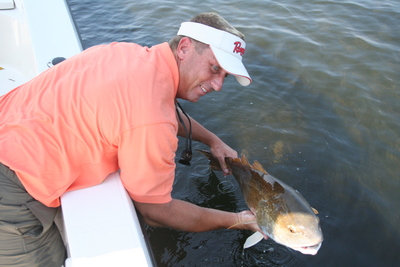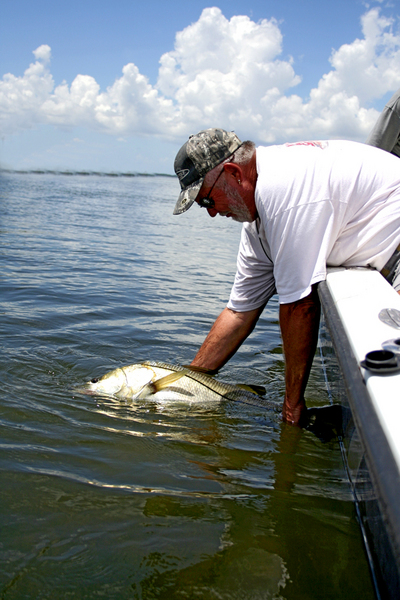As a strong advocate of catch and release I thought I'd put a few words together about catching and safe leasing the things that bring us so much enjoyment. They are ours to protect and should we fail shame on us.
Let's start with what drives Florida's economy and that's tourism which brings approximately forty million people to Florida yearly. Florida's resident population of 14.7 million increases daily and with more than 40 million tourists, most with coastal destinations it's easy to understand why fishing continues to increase significantly over the past decades.
As a favorite activity of its residents and visitors, anglers make approximately 20 million fishing trips, catch somewhere around 141 million fish and responsibly release approximately 50% of everything they caught. Even with a significant number being released the question remains did they live after they where released?
Protect the Fish: After being caught and released fish die for a variety of reasons but usually surrender to the physiological stresses experienced during capture, injuries from the hook, or even the angler. Though they may appear unharmed some still die in spite of our efforts to revive. As unwilling participants caught in a life or death struggle to escape, often and for our own gratification we needlessly cause them to struggle intensely for long periods. This unnecessary extended struggle causes an excessive accumulation of lactic acid to develop within their muscles and blood sending them into a state of complete exhaustion. This ruthless battle to exhaustion ultimately causes physiological stress imbalances resulting in muscle failure, and more often death.
Land' em Quick: As a result it's important to use the proper weight-class tackle, land the fish quickly, and leave it in the water whenever possible. Immediately bringing a physically exhausted fish out of the water prevents it from getting what it needs most to recover Oxygen! (The example often used to describe what a fish might experience would be the same thing a marathon runner may experience if a placed a plastic bag was placed over their head immediately after crossing the finish line.)
Get Pictures Quick: Whenever a photo is required, allow the fish to rest and recover quietly beside the boat for a few minutes. Gently lift it from the water, support it horizontally with a wet hand, snap a couple of quick photos, and gently return it to the water taking a moment to revive it if necessary.
Circle Hooks Protect: Wounds caused by hooks may appear minor to us however damage to gills, eyes, throats or internal organs are often fatal. Studies show it's best to cut the leader at the hook and leave it in a fish that's gut-hooked or hooked deep in its throat. Often fish are capable of eliminating, ousting, or encapsulating foreign objects like a hook. And long drawn out attempts to remove them often causes more damage. Circle hooks however help eliminate those damaging deep hook sets.
Centuries ago circle hooks where made from bone, shell, stone, ivory and sometimes wood. However, after decades of catching fish we've seen them emerge into what we know today. Circle hooks actually gained heavy acceptance in the unmanned long-line fishing industry. Commercial anglers discovered that when hooked in the outer part of the mouth, fish survived longer and because it's rounded inward it was difficult for a fish to displace it and get away.
Crimp Barbs or Go Barb-Less: Circle hooks are the way to go and your catch ratios will improve. Many hooks are available without barbs and if you don't have some; simply crimp the barbs on your existing hooks. You'll still catch the same amount of fish, cause less physical damage and find the hooks much easier to remove.
Need a Reason for Artificial Lures: Artificial lures normally result in less damaging hook-ups because the lures are generally in motion and the hook set happens before its swallowed. Controlled studies indicate that most fish released after hook-and-line capture can survive. However these studies also show that many die as a direct result of being deeply hooked as a result of swallowing live or dead baits. Hook position can definitely affect survival rates and those hooked in the gills, throat or gut normally have a lower survival rate than those hooked in the mouth.
Analysis conducted on several species demonstrated that using live or dead bait often results in the number of hook-related deaths. Regardless of any statistics anglers using live and dead baits should always stay alert for a quick hook-set whenever they feel a bite. Never allow the fish to run because this significantly increases the chances damage.
Maximize Survival: The most important action anglers can take to ensure a successful release is to hook and land the fish quickly, leave it in the water while removing the hook, and make a quick release. Large species such as Sharks and Tarpon should be brought alongside within 20 minutes and the average inshore species with a few minutes of being hooked. If you're consistently landing exhausted fish, requiring extensive efforts at resuscitation, you might consider using heavier tackle.
Every time you must handle a fish make certain your hands or gloves are wet and never lay a fish on a hot boat deck to remove a hook. Place it on a wet towel to help protect its slime coat and cover its eyes with a wet towel to keep it still. Control the fish at all times! If you drop it the chances of damage and death increase.
Make the Decision Early: When you've caught and landed a fish, in no way engage in a lingering discussion over whether or not to release it. Decide beforehand what you're going to keep and immediately release the others. Once you make a decision to keep a fish, stick with it. A fish released from a live well has a decreased chance of survival.
Release Big Fish: Tarpon, Cobia, or Sharks should never be removed from the water because they are often injured when lifted or hauled over the side of a boat so leave them in the water. Take your photographs in the water and turn them loose. Have the necessary tools available, long-nosed pliers or a hook-removal device comes in handy when a hook is difficult to remove by hand. Note of caution: Many times I've had a larger shark come from under the boat and grab a Tarpon I was de-hooking. So, be ever vigilant to the presence of larger predators stalking your catch. Make certain your hand is not part of a quick meal.
Never lift or pull on the leader of a gut-hooked fish to find the hook. If you cannot see in the outer edges of the mouth it's safe to assume it's in a vital area and causing damage. Therefore any additional lifting or pulling only causes more damage. Simply release the fish by cutting the leader as close to the hook as possible.
Revive the Fish: If your fish is in fair to good condition return it to the water headfirst. On the other hand when you release a fish and it doesn't swim away, is lethargic, or erratic it may require some form of resuscitation. The best method of reviving an exhausted but healthy fish is to place one hand under the tail holding the bottom lip with the other. Provided the fish is in fair to good shape, hold it headfirst into the current when possible. If it is severely exhausted, depress the bottom lip to cause the jaw to gape and gently move the fish forward. Never us an irregular back and forth motion as this only induces additional stress. The moment the fish attempts to swim away let it go.
Let's be sure to teach your children and inexperienced anglers these few simple procedures. Anything we can do to educate others helps ensure abundant fish populations for the future.
Captain Woody Gore Tampa Bay Fishing
www.captainwoodygore.com
wgore@ix.netcom.com
813-477-3814




